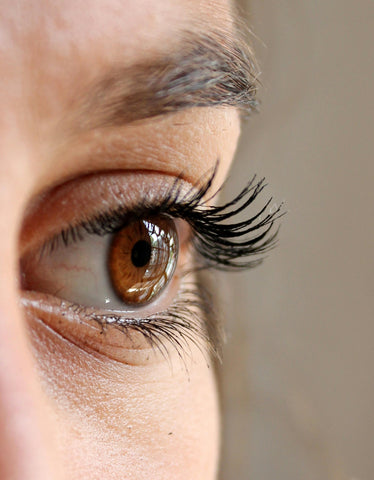Our eyes are marvels of biology, granting us the ability to perceive the world in all its richness and complexity.
Protecting and nurturing their health is paramount, extending far beyond routine eye exams. Nutrition, in particular, plays a pivotal role in safeguarding our vision and overall eye health.

Certain nutrients act as potent defenders against age-related diseases, enhance visual function and maintain the comfort and vitality of our eyes.
In this guide, we will delve into the crucial "dos" and "don'ts" of eye care, with a special focus on the power on key nutrients.
Eye Care Dos
Embrace a Rainbow Plate: Make it a habit to fill your diet with an array of colourful fruits and vegetables, with a special emphasis on leafy greens like spinach and kale. According to Lem DW, Gierhart DL, Davey PG, these vibrant foods are rich sources of carotenoids such as lutein and zeaxanthin, which function as potent antioxidants. By shielding your eyes from harmful light exposure, these nutrients may help reduce the risk of age-related macular degeneration (AMD) and cataracts. Additionally, don't overlook the importance of including orange and red fruits like bell peppers and carrots, which are excellent sources of beta-carotene, another essential nutrient for eye health.
The Power of Omega-3: Similarly, the Eye Lounge shared how you can include Omega-3 in your diet with foods such as fatty fish like salmon, tuna, and mackerel, as well as plant-based sources such as flaxseeds and walnuts. Omega-3s play a crucial role in supporting visual development, particularly in children, and may also alleviate symptoms of dry eyes in adults. Omega-3 fatty acids can help to prevent a range of eye conditions, from dry eye syndrome to macular degeneration, and by incorporating more into your diet, you can promote healthy eyes and reduce your risk of developing eye conditions later in life.

Vitamin D Delight: While commonly known as the "sunshine vitamin," vitamin D is also obtained through dietary sources such as oily fish, eggs, and fortified milk. This essential nutrient contributes to tear production, mitigates inflammation, and offers protective benefits against conditions like AMD and diabetic retinopathy. In Reins RY, McDermott AM’s ‘Vitamin D: Implications for ocular disease and therapeutic potential’, they explore how an adequate vitamin D intake is key to maintaining optimal eye health. The study delves into the multifaceted roles of vitamin D in ocular physiology, highlighting its involvement in regulating immune responses within the eye and modulating inflammatory processes that are central to the development and progression of various ocular diseases. Moreover, research suggests that vitamin D may exert direct protective effects on ocular tissues, including the retina, by reducing oxidative stress and inhibiting pathological angiogenesis, thereby safeguarding against conditions such as AMD and diabetic retinopathy.
Hydration is Key: Stay adequately hydrated by consuming plenty of water throughout the day. Dehydration can contribute to the development of dry eyes and may adversely affect overall eye function. Aim to drink at least eight glasses of water daily, adjusting your intake based on factors such as activity level and climate. Healthline shared some of the common symptoms of dry eyes including sensations of burning, a feeling of having "sand in the eyes," and increased sensitivity to light. Additionally, dry eye syndrome can lead to a rough ocular surface, which can disrupt the passage of incoming light, leading to decreased visual clarity. As a result, individuals may experience increased eye strain, headaches, and difficulty focusing, particularly as the day progresses.

Eye Exercises: Incorporate simple eye exercises into your daily routine to promote flexibility and reduce eye strain. Activities such as focusing on near and far objects or gently rolling your eyes in circular motions can help alleviate tension and enhance visual comfort.
Regular Checkups: Schedule routine eye exams with a qualified optician, even if you are not experiencing any apparent issues. Early detection and treatment of eye conditions are crucial for preserving long-term eye health and visual acuity.
Eye Care Don'ts
Smoking: Avoid tobacco use in all its forms, as smoking significantly elevates the risk of developing various eye diseases, including AMD, cataracts, and diabetic retinopathy. Quitting smoking is one of the most impactful steps you can take to safeguard your eye health and overall well-being.
ASH (Action on Smoking and Health) shared how avoiding tobacco in all forms is vital for eye health. Smoking heightens the risk of various eye diseases, including AMD, cataracts, diabetic retinopathy, thyroid eye disease, and optic neuropathy. AMD, a progressive condition affecting central vision, is notably impacted by smoking, doubling the risk and accelerating onset, particularly in heavy smokers and those genetically predisposed. Similarly, smoking triples the risk of cataracts, with severity correlating to smoking intensity. Diabetic retinopathy, characterized by retinal blood vessel damage, is worsened by smoking-induced increases in blood pressure and glucose levels.
Thyroid eye disease (TED) and optic neuropathy are also associated with smoking. TED, involving eye muscle inflammation, is four times more likely in smokers, exacerbating eye protrusion and vision loss. Smoking raises the risk of anterior ischaemic optic neuropathy (AION), leading to sudden vision loss, and worsens Leber's hereditary optic neuropathy (LHON), causing central vision loss.
Excessive Sugar: Optometrists.org explained how minimizing your consumption of sugary drinks and processed foods can help you maintain good eye health. Consuming excessive sugar can harm your eyes in several ways: it can lead to diabetic retinopathy by damaging blood vessels in the retina, increasing the risk of glaucoma by affecting fluid drainage and optic nerve damage, contribute to cataract formation by causing the lens to swell, and exacerbate age-related macular degeneration, impairing central vision.
Opting for whole, nutrient-rich foods is essential for promoting both systemic and ocular health.

Ignoring Eye Strain: Limit prolonged periods of screen time and take regular breaks when using computers, smartphones, or other digital devices. Healthline shared their 20-20-20 rule to combat eye strain, where every 20 minutes, shift your focus away from the screen and gaze at a distant object for 20 seconds to alleviate eye strain and prevent discomfort.
Rubbing Your Eyes: Refrain from rubbing your eyes, as this can irritate the delicate tissues and potentially introduce harmful bacteria. If you experience itching or irritation, opt for the use of artificial tears or consult with your eye care provider for appropriate management.
Neglecting Protective Eyewear: Prioritize the use of sunglasses that offer UVA and UVB protection whenever you are outdoors, even on overcast days. Prolonged exposure to ultraviolet radiation can increase the risk of developing cataracts and other ocular conditions.
By shielding your eyes from harmful UV rays, you can help preserve their health and vitality over time. The CDC explain how spending time outdoors offers physical activity and vitamin D but requires protection from harmful UV rays to prevent skin cancer. Shielding skin with clothing, hats, sunglasses, and broad-spectrum sunscreen, particularly during peak UV hours, mitigates risk. Implementing shade, promoting sun-safe behaviours, and incorporating sun safety into educational and workplace policies further safeguard against UV exposure and reduce the likelihood of skin cancer development.

The health and well-being of your eyes are of paramount importance, and deserving of mindful attention and care.
By adhering to the "do's" and avoiding the "don'ts" outlined in this guide, you can empower yourself to nourish your eyes with essential nutrients and protective practices. Embrace a diverse and nutrient-rich diet, prioritize regular eye examinations, and cultivate habits that promote optimal eye health.
With diligence and dedication, you can ensure that your eyes continue to serve you faithfully, allowing you to experience the world with clarity, vibrancy, and vitality for years to come.
Au Revoir,
PRET A VOIR











0 comments